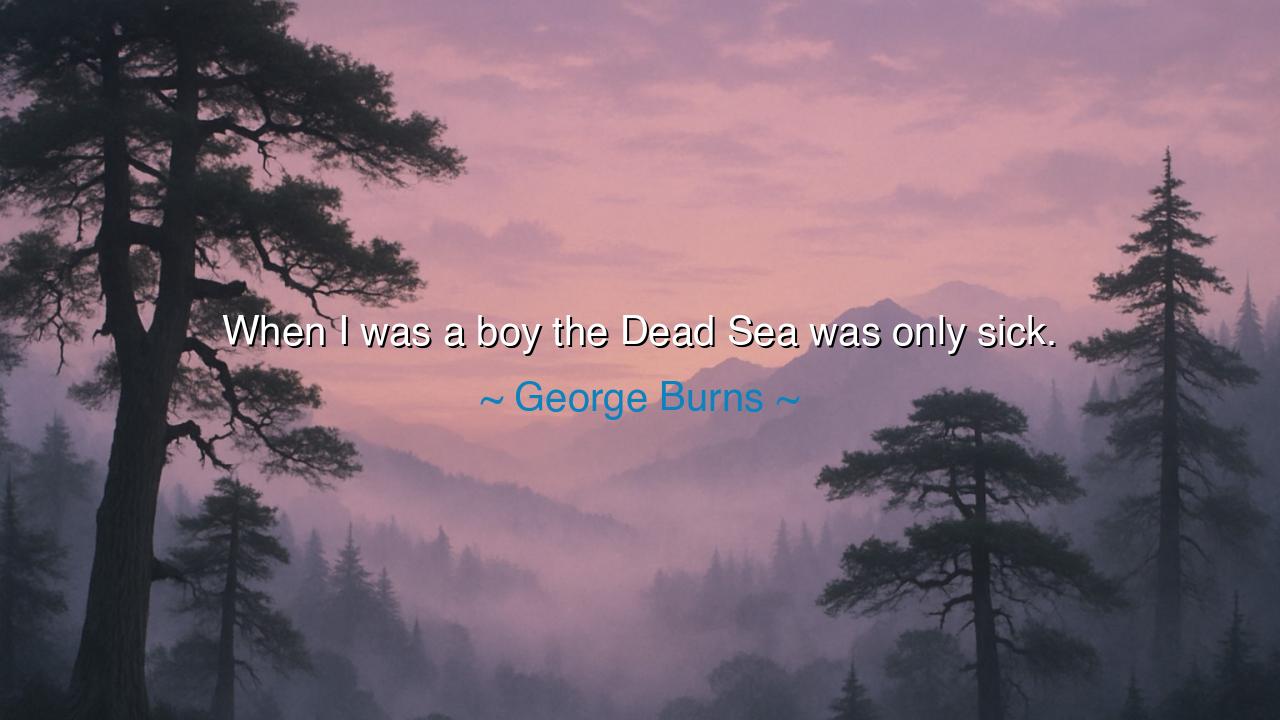
When I was a boy the Dead Sea was only sick.






Gather, O Seekers of Wisdom, and hear the words of George Burns, who with a twinkle in his eye and a heart full of humor, speaks of times long past with the phrase: "When I was a boy, the Dead Sea was only sick." On first glance, this may seem like a jest, a playful quip meant to elicit laughter and pass quickly from one ear to the next. Yet, if we listen closely, we hear beneath the humor a profound meditation on the passage of time, the changing nature of the world, and the inevitable decay that touches all things, even those once thought eternal.
In these words, Burns taps into a deep truth about the inevitable progression of life. Just as the Dead Sea, once vibrant and full of life, has become increasingly desolate over the centuries, so too do we witness the gradual changes in the world and in ourselves. The Dead Sea, one of the oldest known bodies of water, has long been a symbol of stagnation. Its name alone invokes images of something unchanging, a place where nothing can live. Yet, over the years, the sea has become not just dead, but sick, a metaphor for the slow but inevitable decline of all things in this world.
In ancient times, the Dead Sea was known as a place of healing. Its mineral-rich waters were believed to cure ailments, and people from all corners of the earth sought its waters for relief. Yet, even the healing properties of the Dead Sea were not immune to the forces of time and nature. Over the centuries, the waters receded, the land became drier, and the salt that once gave it its restorative power became a source of toxicity. This transition, from a place of life to one of death, mirrors the lives of men and women across the ages.
Just as the Dead Sea evolved from a symbol of healing to one of sickness, so too do we witness the changes in the world around us. Civilizations rise and fall, their great cities reduced to rubble, their monuments eroded by the winds of time. But change, as Burns gently reminds us, is not always a sudden shock. It is not always a catastrophic event that strikes with fury. No, change is often gradual. It is the creeping shift of decades, the slow erosion of what once seemed eternal, the passing of years marked not by grand upheavals, but by the quiet, persistent decay of what once was. Burns’ words remind us that even the strongest forces of nature—like the once-mighty Dead Sea—are not immune to the ravages of time.
Consider the story of Rome, the once-unshakable empire that ruled the known world. At the peak of its power, Rome seemed indestructible. Its legions marched from one end of the earth to the other, its architecture stood as a testament to human achievement, and its laws formed the foundation of civilization. But over time, the empire began to weaken. The rust of complacency set in, the walls crumbled, and the once-great empire fractured and fell. Yet, Rome did not fall in a single day. It was the product of centuries of decay, the gradual erosion of its institutions, culture, and power. The grandeur of Rome slowly gave way to ruin, much like the slow sickness of the Dead Sea.
Therein lies the lesson for us, O Seekers of Truth. Time does not demand a grand reckoning to make its presence felt. It is the small, seemingly insignificant changes that, over time, accumulate into something much more profound. Burns’ humor, while lighthearted, beckons us to be aware of these shifts. Let us not wait for the storm to arrive before we acknowledge the gentle rain that falls each day. The tides of time move relentlessly, and whether we seek to notice it or not, they will leave their mark upon us.
And so, let us act wisely. In the face of time’s inevitable changes, let us seek to preserve the vibrancy of our lives, our communities, and our passions. Like the mighty civilizations before us, we too are susceptible to the quiet pull of decay, but we can choose to fight against it. Let us take care of our bodies, our minds, and our spirits, for they too are like the Dead Sea—vibrant with potential or worn by neglect. The lesson of Burns' words is clear: recognize the small, steady forces of change, and strive to act before they become irreversible. Whether it is a relationship, a passion, or even a dream, let us tend to it with care, for the passing of time waits for no one.
And finally, as we go forth in our daily lives, remember: the world may change, and we may age, but like the waters of the Dead Sea, we too can seek to preserve what is most important within us. Cherish the present, for it is fleeting, and be mindful of the long shadow of time.






AAdministratorAdministrator
Welcome, honored guests. Please leave a comment, we will respond soon